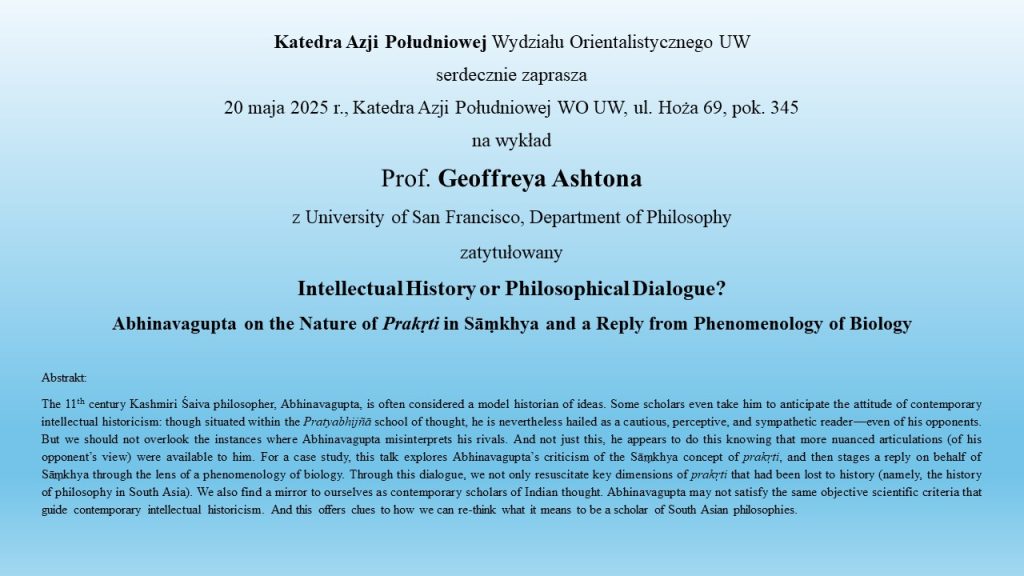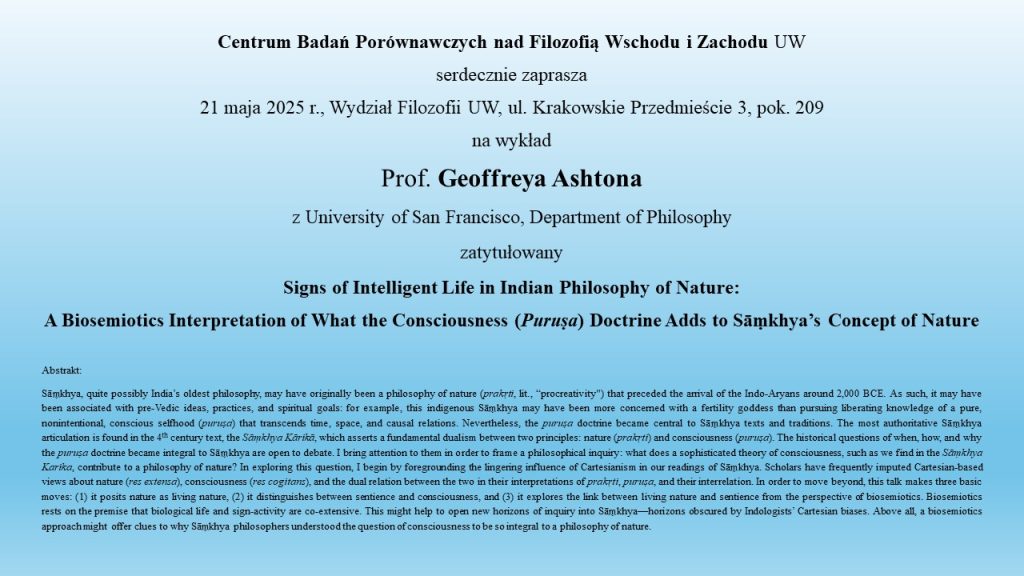The Centre for Comparative Studies in Eastern and Western Philosophy in collaboration with the Department of South Asia of the Faculty of Oriental Studies, is pleased to host Prof. Geoffrey Ashton of the University of San Francisco, Department of Philosophy.
We invite to the following lectures:
1) 20 May 2025, Department of South Asia, WO UW, 69 Hoza St., Room 345
Intellectual History or Philosophical Dialogue?
Abhinavagupta on the Nature of Prakṛti in Sāṃkhya and a Reply from Phenomenology of Biology
Abstract:
The 11th century Kashmiri Śaiva philosopher, Abhinavagupta, is often considered a model historian of ideas. Some scholars even take him to anticipate the attitude of contemporary intellectual historicism: though situated within the Pratyabhijñā school of thought, he is nevertheless hailed as a cautious, perceptive, and sympathetic reader—even of his opponents. But we should not overlook the instances where Abhinavagupta misinterprets his rivals. And not just this, he appears to do this knowing that more nuanced articulations (of his opponent’s view) were available to him. For a case study, this talk explores Abhinavagupta’s criticism of the Sāṃkhya concept of prakṛti, and then stages a reply on behalf of Sāṃkhya through the lens of a phenomenology of biology. Through this dialogue, we not only resuscitate key dimensions of prakṛti that had been lost to history (namely, the history of philosophy in South Asia). We also find a mirror to ourselves as contemporary scholars of Indian thought. Abhinavagupta may not satisfy the same objective scientific criteria that guide contemporary intellectual historicism. And this offers clues to how we can re-think what it means to be a scholar of South Asian philosophies.
2) May 21, 2025, Department of Philosophy, Krakowskie Przedmieście 3, room 209
Signs of Intelligent Life in Indian Philosophy of Nature:
A Biosemiotics Interpretation of What the Consciousness (Puruṣa) Doctrine Adds to Sāṃkhya’s Concept of Nature
Abstract:
Sāṃkhya, quite possibly India’s oldest philosophy, may have originally been a philosophy of nature (prakṛti, lit., “procreativity”) that preceded the arrival of the Indo-Aryans around 2,000 BCE. As such, it may have been associated with pre-Vedic ideas, practices, and spiritual goals: for example, this indigenous Sāṃkhya may have been more concerned with a fertility goddess than pursuing liberating knowledge of a pure, nonintentional, conscious selfhood (puruṣa) that transcends time, space, and causal relations. Nevertheless, the puruṣa doctrine became central to Sāṃkhya texts and traditions. The most authoritative Sāṃkhya articulation is found in the 4th century text, the Sāṃkhya Kārikā, which asserts a fundamental dualism between two principles: nature (prakṛti) and consciousness (puruṣa). The historical questions of when, how, and why the puruṣa doctrine became integral to Sāṃkhya are open to debate. I bring attention to them in order to frame a philosophical inquiry: what does a sophisticated theory of consciousness, such as we find in the Sāṃkhya Karika, contribute to a philosophy of nature? In exploring this question, I begin by foregrounding the lingering influence of Cartesianism in our readings of Sāṃkhya. Scholars have frequently imputed Cartesian-based views about nature (res extensa), consciousness (res cogitans), and the dual relation between the two in their interpretations of prakṛti, puruṣa, and their interrelation. In order to move beyond, this talk makes three basic moves: (1) it posits nature as living nature, (2) it distinguishes between sentience and consciousness, and (3) it explores the link between living nature and sentience from the perspective of biosemiotics. Biosemiotics rests on the premise that biological life and sign-activity are co-extensive. This might help to open new horizons of inquiry into Sāṃkhya—horizons obscured by Indologists’ Cartesian biases. Above all, a biosemiotics approach might offer clues to why Sāṃkhya philosophers understood the question of consciousness to be so integral to a philosophy of nature.

